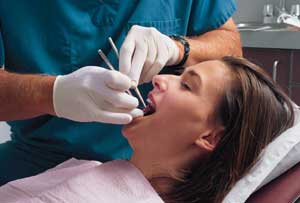Dentist
Tasks & duties

Dentists may do some or all of the following:
-
listen to and talk with patients to establish what their needs are
-
examine the mouth, teeth, gums and jaw
-
diagnose diseases
-
assess and refer patients to other dental specialists and health professionals
-
give pain relief to patients
-
treat diseased teeth in various ways, including placing bonded fillings, fitting crowns or extracting teeth
-
treat infected and diseased teeth with root canal treatment
-
treat diseased gums, jaw-joint and other general mouth problems
-
advise patients on how to keep their teeth clean and prevent diseases
-
replace missing teeth with implants, bridges, or partial or full dentures
-
improve the appearance of teeth with veneers, crowns or bleaching
-
fit braces to straighten teeth
-
be involved in research
Specialisations
Oral and Maxillofacial Surgeon
Oral and maxillofacial surgeons diagnose diseases, injuries, and defects of the jaw and surrounding structures. They also perform surgery to correct these diseases, injuries or defects. This surgery can include managing facial trauma from a car accident or the extraction of wisdom teeth.
Periodontist
Periodontists are dental specialists who treat diseases of the gums to prevent tooth loss.
Oral Medicine Specialist
Oral medicine specialists' diagnose and manage the oral health care of patients with medically related disorders of the teeth and jaw.
Endodontist
Endodontists specialise in dental treatment for root canal problems.
Orthodontist
Orthodontists diagnose and correct bad bite, crooked teeth and poor jaw growth in children and young people. This often involves fitting braces and can involve correcting facial abnormalities such as cleft palate.
Paediatric Dentist
Paediatric dentists specialise in the oral health care of children from birth through to adolescence. Their work involves the management of dental problems related to medical, behavioural, physical or developmental disabilities.
Oral Pathologist
Oral pathologists study the causes and development of diseases associated with the mouth. Their work involves examining specimens from patients' mouths to diagnose diseases such as tumours.
Special Needs Dentist
Special needs dentists specialise in the oral health care of people with intellectual, medical, physical or psychiatric disabilities.
Prosthodontist
Prosthodontists treat difficult dental problems such as badly broken or missing teeth. This often involves using crowns, bridges, dentures or dental implants to improve the function and look of a patient's mouth.
Skills & knowledge

Dentists need to have:
-
knowledge of the structure and function of the teeth, jaw and mouth
-
skill in assessing and diagnosing dental problems
-
understanding of the structure and functions of the body, and general injuries and diseases of the body, especially the head and neck
-
knowledge of injuries and diseases of the mouth
-
knowledge of dental methods, materials and medicines
-
knowledge of oral health care methods
-
knowledge of hygiene and sterilisation procedures
-
good people and communication skills
-
problem-solving skills
-
decision-making skills
-
first aid skills
Entry requirements
To become a dentist you need to have a Bachelor of Dental Surgery or an equivalent overseas qualification that is accepted by the Dental Council of New Zealand.
An Annual Practising Certificate and registration with the Dental Council of New Zealand is also required.
Secondary education
A tertiary entrance qualification is required to enter tertiary training. Useful subjects include chemistry, physics, biology and maths with statistics or calculus.
Tertiary education
Entry into the dentistry degree is based on academic performance in the first year of university study and an interview with the School of Dentistry Application Board.
Training on the job
Skills are improved on the job. Under the Health Practitioners Competence Assurance Act 2003, dentists are required to attend and take part in continuing education organised by the New Zealand Dental Association.
Registration
Dentists must be registered with the Dental Council of New Zealand.
Useful experience
Any experience working with people – such as in the hospitality, health or personal and customer services industries – is useful.
Related courses
Dentistry
For more information, please refer to Career Services.
Document Actions
